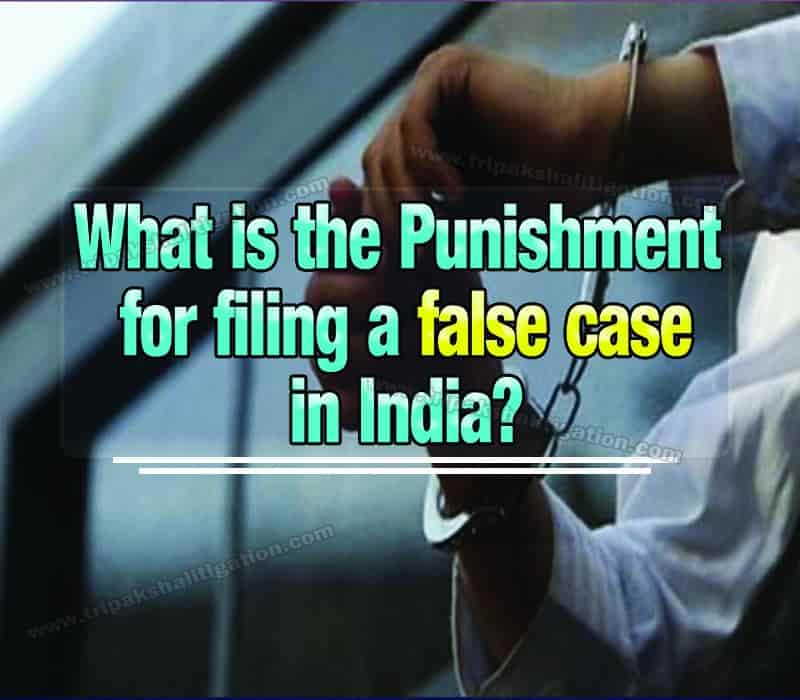There is no safeguard in place even after various courts repeatedly show their concerns over the increasing misuse of laws specifically by women in India and some legal experts have suggested that legal provisions are required to discourage the filing of false complaints[i].
The Delhi High Court recently stated that rape laws that are enacted for safeguarding and protecting women have been misused as “a weapon for vengeance and vendetta” to harass and even force a man to marry. It was also observed in some of the cases that women have consensual sex and later on file a rape case against the man when the relationship ends to force him to get married this only makes a “mockery” of the marriage but also inflates the statistics of rape cases.
In the case of Manisha Sandeep Gade v. Sandeep Vinayak Gade[ii]– The High Court of Bombay considered the question as to whether the unsubstantiated allegation of adultery against the husband by the wife would amount to mental cruelty and held that it would amount to mental cruelty[iii].
According to 2016 data on crimes in India compiled by the National Crime Records Bureau, Ministry of Home Affairs; it provided that in the year 2016, 5347 cases were found to be false cases out of the investigated by the Scheduled Castes and 912 were found to be false cases out of Scheduled Tribes cases. Further, as per the data of 2015, out of 15638 cases decided by the courts, 11024 cases resulted in acquittal or discharge, 495 cases were withdrawn and 4119 cases resulted in a conviction[iv].
In Ram Kumar Nanki v. State of Madhya Pradesh[v]-The Apex Court has acquitted a man convicted who was charged in a dowry death case. The accused’s wife committed suicide by setting herself on fire. In the letter, she mentioned the reason that she is dying because of her husband. The lower courts condemned him to be detained for ten years. However, the Apex Court acquitted him finding the case to be bogus against the husband.
Dishonestly making false claim in the court
Once it appears prima facie that an offense u/s 209 of the Indian Penal Code (IPC) has been made out and it is expedient in the interest of justice, then the Court shouldn’t hesitate to make a complaint u/s 340 CrPC[vi].
Section 209 IPC says, dishonestly making false claim in Court. “Whoever fraudulently or dishonestly, or with intent to injure or annoy any person, makes in a Court of Justice any claim which he knows to be false, shall be punished with imprisonment of either description for a term which may extend to two years, and shall also be liable to fine.”
The Court had drawn the following conclusions in the case of H.S Bedi v. National Highway Authority of India[vii]:
- Section 209 of the IPC is a salutary provision that was enacted to preserve the sanctity of the Courts and for safeguarding the administration of law punishing the litigants making false claims.
- False evidence in the vast majority of cases springs out of false pleading and would be entirely banished from the Courts if false pleading could be prevented.
- U/s 209 a person filing a false complaint shall be punished with imprisonment of either description for a term which may extend to two years, and shall also be liable to fine.
- When a false claim is made the court shall issue a show-cause notice to show cause as to why a complaint was made u/s 340 of the CrPC to make a false claim u/s 209 of the IPC.
- Before making a complaint under Section 340 CrPC the Court shall consider whether it is expedient in the interest of justice to make a complaint.
Remedies against False Complaint and FIR
For defending yourself and your family against a false charge and from being arrested you need to first apply for anticipatory bail. You need to collect evidence against the charges including call records, emails, photographs, statements of neighbors supporting you, etc. Very importantly, do collect evidence that you have not taken dowry and that your wife has moved out of the matrimonial house without any valid reason. All this will help you to get anticipatory bail.
If a false complaint is lodged against a person for a non-bailable offense, then to circumvent the police custody the said person can apply for Bail u/s 438 of the Code of Criminal Procedure, 1973 (CrPC) before the Sessions Court or the High Court, before the arrest is made.
In the case of Rashmi Rekha Thatoi and Ors. v. State of Orissa and Ors.[viii]– It was clarified that the said provision cannot be invoked once the arrest of the accused is made. After arrest, the person can seek his remedy U/s 437 or 439 of the CrPC, if he wants to be released on bail in respect of the offense or offenses for which he is arrested.
Punishment[ix]
A complainant making false allegations and lodging fabricated FIR shall be punished with: Imprisonment of either description for a term which may extend to two years, or with fine, or with both.
If the criminal proceeding is instituted on a false charge of an offense punishable with death, imprisonment for life, or imprisonment for seven years or upwards, then the complainant making false charges shall be punished with imprisonment of either description for a term which may extend to seven years, and shall also be liable to fine.
Punishments for giving false evidence
Section 193 of the Indian Evidence Act
Whoever intentionally gives false evidence in any stage of a judicial proceeding, or fabricates false evidence to be used in any stage of a judicial proceeding, shall be punished with imprisonment of either description for a term which may extend to seven years, and shall also be liable to fine; and whoever intentionally gives or fabricates false evidence in any other case, shall be punished with imprisonment of either description for a term which may extend to three years, and shall also be liable to fine.
Section 196 [Using evidence knowing it to be false]
Whoever corruptly uses or attempts to use as genuine evidence any evidence which he knows to be false or fabricated, shall be punished in the same manner as if he gave or fabricated false evidence.
Section 199 False statement made in declaration which is receivable as evidence
Whoever, in a declaration made or subscribed by him, which declaration any Court of Justice, or any public servant or another person, is bound or authorized by law to receive as evidence of any fact, makes any statement which is false, and which he either knows or believes to be false or does not believe to be true, touching any point material to the object for which the declaration is made or used, shall be punished in the same manner as if he gave false evidence.
Remedies and Punishment against false cases: Criminal Laws
- A criminal case can be filed under Section 120B of the IPC if the husband finds that his wife is criminally conspiring against him and his family members.
Punishment: Punishable with death, imprisonment for life, or rigorous imprisonment for a term of two years or more shall be punishable in the same manner as if he/she had abetted the commission of such an offense, if no explicit punishment for the commission of such a conspiracy has been provided for, by the Code.
If the parties involved in the conspiracy, conspired to commit an offense punishable with terms not prescribed previously, such persons shall be sentenced to imprisonment for a term not exceeding six months, or a fine, or both.
- Section 181: False statement given under oath to a public servant or any other person legally competent to administer an oath. (Especially useful where the ‘victim’ has given a false statement to the Magistrate under Section 164 CrPC, under path administered by him)
Punishment: Shall be punished with imprisonment of either description for a term which may extend to three years, and shall also be liable to fine
- If false information is given to the police by your wife then you may precede u/s 182 of the IPC. The police officer will write a complaint and will forward it to the concerned officer and criminal proceedings shall start.
Punishment: Imprisonment of either description for a term which may extend to six months, or with fine which may extend to one thousand rupees, or with both.
- A case can be brought under Section 191 of the IPC against the wife if she is bringing false evidence on record of the court.
- Section 197 of IPC: Issuing or signing a false certificate Perjury is a crime; one can’t sign a false certificate and claim it to be valid. Consequently, if somebody suffers due to some wrong certificate, he can prove himself innocent after showing adequate evidence.
Punishment: Shall be punished in the same manner as if he gave false evidence.
- Where a case is already pending against you in the court you may initiate criminal proceedings under Section 211 of the IPC that deals with ‘false charges made with intent to injure’. An application under Section 340 CrPC is to be filed before the court where the trial is going.
Punishment for the false charge of offense made with an intent to injure: 2 years or fine or both
Punishment if offense charged be punishable with imprisonment for 7 years or more: 7 years and fine
Punishment if offense charged be capital or punishment with imprisonment for life: 7 years and fine
- Section 250 of CrPC: The acquitted person may file for compensation for accusation without reasonable cause before the Court. The court may award compensation along with sentencing the wrong-doer for simple imprisonment.
- Section 471 of IPC: Whoever falsely or unscrupulously utilizes as genuine any [document or electronic record] which he knows or has a reason to accept to be a forged [document or electronic record], will be punished similarly as though he had manufactured such [document or electronic record].
- File a countersuit under Section 500 of the IPC i.e. for defamation; you can file a suit claiming that your wife is trying to malign your and your family’s reputation by putting false accusations.
Punishment: Whoever defames another shall be punished with simple imprisonment for a term which may extend to two years, or with a fine, or with both.
- A counterclaim under Section 506 of the IPC for criminal intimidation can be filed if a wife threatens her husband or his family members.
Punishment: Whoever commits, the offense of criminal intimidation shall be punished with imprisonment of either description for a term which may extend to two years, or with fine, or with both; if the threat is to cause death or grievous hurt, etc.
Conclusion
The false allegations against men for seeking a divorce have been increasing each day, and it’s a significant issue as it disregards basic fundamental liberties. We cannot deny the fact that women have been misusing the law for harassing their husbands and to satisfy their unlawful demands against their spouses. Time and again in various judgments the courts have mentioned that there is a need for an amendment to laws protecting Indian men. The Delhi Court[x] stated that “It is time now to have laws to protect and restore the dignity of men charged with false rape cases as everyone is just fighting to protect the honor of women”.
[i] https://timesofindia.indiatimes.com/india/mentoo-legal-experts-demand-courts-should-punish-those-filing-false-complaints/articleshow/69709275.cms
[ii] AIR 2005 Bom 180
[iii] https://lexspeak.in/2020/07/you-will-surely-get-divorce-if-you-have-this-thing-in-divorce-case
[iv] Annual Report 2016-2017 published by the Department of Social Justice & Empowerment, Ministry of Social Justice and Empowerment, Government of India
[v] [Criminal Appeal No.814 of 2020]
[vi] H.S. Bedi Vs. National Highway Authority of India
[vii] https://www.mondaq.com/india/trials-appeals-compensation/840672/perjury-false-claim-false-prosecution-in-a-case-section-209-of-ipc-section-340-of-the-crpc
[viii] (2012) 5 SCC
[ix] https://blog.ipleaders.in/legal-rights-false-forged-first-information-report-fir-complaints/
[x] https://www.firstpost.com/india/time-to-have-laws-protecting-dignity-of-men-charged-with-false-rape-cases-delhi-court-2637154.html








